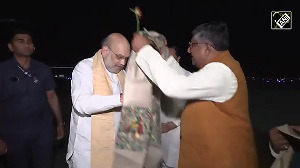The Indian-American community has come out in strong support of United States President Barack Obama, who kicked off his re-election campaign with two rallies in Ohio and Virginia, with an overwhelming 85 per cent of them favouring a second term for him.
Nearly 85 per cent of the Indian-Americans support Obama for a second term, according to a latest survey conducted by Lake Research Partners, a DC-based political consultancy firm, with APIAVote. APIA stands for Asian American Pacific Islander.
"President Obama was strongest among Indian-American voters, leading Mitt Romney by a margin of 76 to eight per cent in the poll, and weakest among Filipino Americans, where the vote was 57 per cent to 20 per cent. Among Chinese Americans, it was 68 per cent for Obama, 8 per cent for Romney," said Toby Chaudhuri, veteran strategist and chair of APIAVote.
The result of the survey conducted by Lake Research Partners is similar to that of India in New England, an ethnic Indian-American publication, which in an online survey in February had said that 80 per cent of Indian-Americans support Obama against Romney.
According to the Lake Research Partners survey, Indian-Americans have the highest favourable opinion of Obama as compared to other Asian-Americans.
More than half (51 per cent) have very favourable views on Obama, and 85 per cent overall have favourable views -- compared to 34 per cent of Asian-Americans who hold very favourable views.
Indian-Americans are also more negative towards Mitt Romney, with 56 per cent having unfavourable views about him (44 per cent of Asian-Americans have unfavourable views).
Indian-Americans are also the group that is more satisfied with the job Obama is doing -- 63 per cent say he is doing an excellent or good job, compared to 49 per cent of Asian-Americans overall, the survey results showed.
In terms of the Presidential ballot, Obama is strongest among Indian-American voters, leading Romney 76 to eight per cent.
They are loyal to Obama -- two-thirds (67 per cent) reported voting for him in 2008, and only seven per cent said they voted for John McCain.
According to the survey, 80 per cent of Indian-Americans have favourable views of the Democratic Party (42 per cent very favourable) -- compared to 65 per cent of Asian-Americans overall who have favorable views, 26 per cent very favourable.
Indians again are more negative towards the Republican Party, with two-thirds (67 per cent) having unfavourable views of the Republican Party.
Indians are the most heavily Democratic Asian group: 65 per cent identify with the Democratic party, 20 per cent with Independents, and only 9 per cent with Republicans -- Asian-Americans overall are more Democratic, but with a smaller margin: 53 per cent identify with Democrats, 21 percent as independents, and 16 percent as Republicans, it says.
Only pluralities, not majorities, of Filipinos, Koreans, and Vietnamese identify as Democrats.
Despite this, only 30 per cent have reported being contacted by the Democratic Party a great deal or some in the past two years (12 per cent a great a deal), with two-thirds (67 per cent) reporting a little or no contact from the Democratic Party, the survey reports.
"Asian Americans are on the rise and Indian Americans are providing a lot of the lift. They are gaining popularity and strength, institutional capacity and political sophistication. They are enjoying an expanded coalition and witnessing an exciting new generation of Indian American leaders who are transforming America's political debate," Chaudhuri said.
"The poll's most dramatic findings were around views about the presumptive GOP presidential nominee. Nearly a third said they have no opinion of Mitt Romney, leaving a lot of room to define him in this group. Although Asian Americans overwhelmingly like President Obama, with nearly three-quarters viewing him favourably, they feel much less so when it comes to his job performance. On the issues, Asian Americans aren't happy with the economic situation, but believe the country is moving in the right direction," he said.
Asian-Americans identified overwhelmingly as Democrats in the poll -- more than three times the Republicans -- but less than a third were contacted by the Democratic Party in the last two years, while 37 per cent of Republicans said they heard a great deal from their party over the same period.
"Independents barely heard from either party even though they are usually prime targets," Chaudhuri said.









 © 2025
© 2025